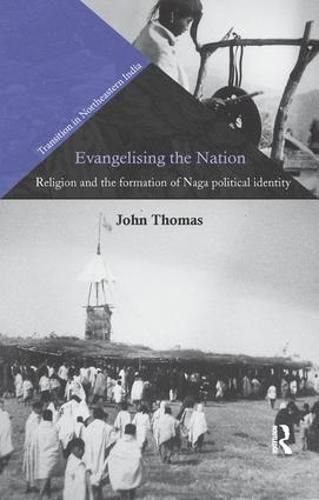Readings Newsletter
Become a Readings Member to make your shopping experience even easier.
Sign in or sign up for free!
You’re not far away from qualifying for FREE standard shipping within Australia
You’ve qualified for FREE standard shipping within Australia
The cart is loading…






Northeast India has witnessed several nationality movements during the 20th century. The oldest and one of the most formidable has been that of the Nagas - inhabiting the hill tracts between the Brahmaputra river in India and the Chindwin river in Burma (now Myanmar). Rallying behind the slogan, ‘Nagaland for Christ’, this movement has been the site of an ambiguous relation between a particular understanding of Christianity and nation-making.
This book, based on meticulous archival research, traces the making of this relation and offers fresh perspectives on the workings of religion in the formation of political and cultural identities among the Nagas. It tracks the transmutations of Protestantism from the United States to the hill tracts of Northeast India, and its impact on the form and content of the nation that was imagined and longed for by the Nagas. The volume also examines the role of missionaries, local church leaders, and colonial and post-colonial states in facilitating this process.
Lucidly written and rigorous in its analyses, this book will be of interest to scholars and researchers of South Asian history, religion, political science, sociology and social anthropology, and particularly those concerned with Northeast India.
$9.00 standard shipping within Australia
FREE standard shipping within Australia for orders over $100.00
Express & International shipping calculated at checkout
Northeast India has witnessed several nationality movements during the 20th century. The oldest and one of the most formidable has been that of the Nagas - inhabiting the hill tracts between the Brahmaputra river in India and the Chindwin river in Burma (now Myanmar). Rallying behind the slogan, ‘Nagaland for Christ’, this movement has been the site of an ambiguous relation between a particular understanding of Christianity and nation-making.
This book, based on meticulous archival research, traces the making of this relation and offers fresh perspectives on the workings of religion in the formation of political and cultural identities among the Nagas. It tracks the transmutations of Protestantism from the United States to the hill tracts of Northeast India, and its impact on the form and content of the nation that was imagined and longed for by the Nagas. The volume also examines the role of missionaries, local church leaders, and colonial and post-colonial states in facilitating this process.
Lucidly written and rigorous in its analyses, this book will be of interest to scholars and researchers of South Asian history, religion, political science, sociology and social anthropology, and particularly those concerned with Northeast India.